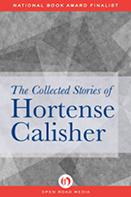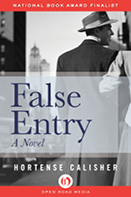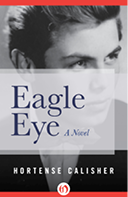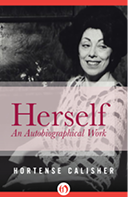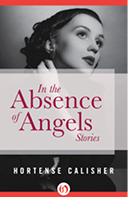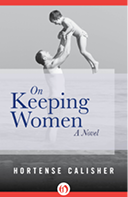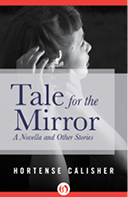Kissing Cousins: A Memory (12 page)
Read Kissing Cousins: A Memory Online
Authors: Hortense Calisher
Tags: #Biography & Autobiography, #Personal Memoirs

But it is the mannerliness that most rushes me back. Clarence, or any of the men of my father’s circle, could have written such a letter, or even perhaps that poor collage of a man—barber-pole body, toothbrush moustache, and cigarette in two fingers—the untrustworthy bookkeeper. Who, I only now recall, was as nice to me as if he were not a known miscreant, only rather furtively, as if his good qualities, too, were about to be found out. I see the poker table, at which he—I realize now—must not have been allowed to play. Bent at the waist as if still hunched over his doubtful books, dangling his fag in contrast to the players’ Garcia Vegas, present in our family bosom only because of his sister, our sister-in-law Belle, now herself a renegade, he watches hungrily—inscribed in a child’s brain and waiting to tell her his last name: Leeman, Harry B.
But what Charles has to tell me about Katie is the real shocker. Had I ever heard that Katie herself wrote stories? She once told him she had, publishing them under an assumed name. But would never tell him more, except that the income from them had been given to charity. He wished now to enlist my help in finding them in order to set all to rights and pay her memory its proper due.
The shock to me was not so much that she had written. Everyone has memory, fantasy, and a will to record; a handful of us turn professional. Once you are so, you become aware that all the world’s readers are in some sense what you are. Only a lack of your excessive need to exercise that sensibility, or of “talent” as some have the sad grace to say, has kept them amateur. I can never answer them—even the ones who say: “I’d write, but I have to give my time to more important things”—except with a full and grateful throat at my own happenstance, or else a private laugh. I used to tell students that for the many who have the linguistic equipment to be a writer—a serious one—the rest is stamina, and some luck. During my middle years I would have added: and character, not necessarily all good, but there. Now I would add: a willingness to be burdened by the overview—plus an inability to escape it.
Were the few pages shown me as Nita’s by Katie, and still somewhere in my archives, really Katie’s? I think not; she would not have been that deceptive. They were given me as family record. Yet don’t I seem to recall that at one time she did say, really only mention, that she had once written some stories herself, even publishing some? I must have said I’d like to see them; I would surely have said that. But she made so little of it—I think I remember—that I must have backed off, especially so if she told me the money went to charity. There are quasi-publications that do this; perhaps her stories were anecdotes of her nursing life? Or perhaps they were not. The shock is that in my mind I assigned them there, or to some other quasi-place. I listened with the hauteur of the professional.
Do I have regrets over the possible stories themselves? Not much more than for curiosity’s sake. I think Katie herself only wanted us to know—so much. Family knowledge among us was many-layered; much or maybe all was known, but not all was talked about. That, too, contributed to the sense of clan. Briefly I did regret that I hadn’t paid more honor to the fact that she, too, was a recorder—on the page. Then I saw what she must have, that for me to become in any way the mentor or the authority would not have done, was not in her idea of us. Rather, our twosome must preserve what by reason of regional and family habit and my side’s eccentric generational mixups we so happily were—two ponderers, one always up ahead, one just precocious enough to keep in step.
One step more. Do I feel I have here in these pages exposed what she might have kept secret? Not at all. If she was trained by her era not to expose, it was ambivalently, for at the same time there was all that family leeway of ours, by which the covert gossip as to what did happen could go merrily, dramatically on. What Katie has done, before death and even after, is to preempt me to her service, just as she preempted my mother’s. She always had the strictest sense of what was owed, by her and to her. She still instructs me as to how love can pay. She was my nurse.
So, this Sunday afternoon I have just telephoned Charles, I am not quite sure why. To be sure of my facts? To let him know I am writing this? Or because the solo flight of the mnemoniac is performed in an Arctic chill extreme?
Charles is the grandson of Aunt Beck’s sister. In our long, random conversation he tells me she was entirely lacking in Beck’s humor. As for the stories: “Katie got involved with a group of young people who were doing such things. The money she received went to an orphanage.” He is disappointed to hear that Aaron’s wife, Leona, to whom I had written at his suggestion, knew nothing of this, although he is interested to hear that she answered me—as she would not have answered him. I scent the acrid, burnt-out smell of old feuding—that air was stimulating once. Feuding families are usually strong families; the warring is in part how they keep themselves vibrant in the world; let the world hear their drum and brassy twang.
Charles, who does not lack humor, wants to talk about Nita, whom I surmise he liked more than I.
Did I know she was a graduate chemist—City College—and that she once was Eddie Cantor’s secretary? Quit, because he wouldn’t give her the Jewish holidays—wouldn’t believe she was a Jew. “Made a fuss about giving his own Social Security back to the government—but wouldn’t give his secretary that.”
A lovely anecdote, but at first hard to reconcile with the Nita I knew—her plump fastness of breasts neatly held in, but down whose crack a crumb now and then disappeared. So she quit, did she?—not much else a woman could maybe do, then. But the harder she quit, the harder Katie coped.
I take another tack to ask about Katie’s fiancé. Yes—“he was killed in the war.” Charles does not recall his name, but his wife might; I hear him call out to her: “Jeanette!” No, at the moment she can’t summon it.
So, that young doctor who stayed with the wounded, and now himself a skull, is scrabbled for maybe the last time—by two strangers to him and to each other, on the phone from New York to Baltimore. I think of how an individual life winds down to less and less mention—toward the last. These are the mnemoniac scraps. Our world rains with them, invisible but everywhere. I myself cannot linger much longer here—even for Katie Pyle.
And was it all preamble, this? In the course of writing this, I have sometimes stopped myself, saying: It’s all preamble; when does the story begin? The answer is in the verb: it began. And daily begins. Memory is the marching companion of the consciousness; it pulses in our fingertips as we live and breathe and cram our mouths and twist in the sexual bed—and fade. That’s why some people believe in heaven. Surely this preamble life, so vigorous, so organized even to its goose-step wars, or so wandering the fields of family voice, must point, surely points somewhere? To the final burst of bloom that is the simple soul’s Eden come round again? To the honey-ooze of all our molecules into—a status quo?
Uh-uh.
No Sunday School certifies a heaven for the Jews. We believe in a Messiah. That gets us off the hook.
So, Katie, let us sum up. For it is us, isn’t it? There were two cousins here all along. The younger cousin had her elder cousin keep on later in the day than a child born to that crowd—even if to a younger mother—could have hoped. Having such an elder stretches the time span. The elder cousin had a quondam daughter, almost. Each of them without obligation. Yet there are people who cannot die until we do. I have a host of those now. You may not be the last. Wearing Beck’s broad wedding band, as I often do, brings that vivid host before me, most of them as unknown to her as she to them. Wearing it tells me who I am.
Katie, I hear the word “give” in all its uses. Give; give in; never give up. I see us prying for safety in all the corners behind our army of chairs. And what was safety, for us? A place in which you played for time in which to weave stories. How can we hold anyone safe in our arms except there?
What are family stories except exorcism? Answer: celebration. We celebrate the future of what was. So it is best to dedicate this story to a relative, preferably young, and of the blood. In this case a Katy of a different spelling, a girl with brown teacup eyes.
“You don’t sound Southern at all,” she said once, hearing some of our history.
I could have answered her the way I do in England, where I am said not to sound American: Oh, I’m a parrot. I talk like whoever’s on the bus. Or I could turn granny coy and say: I’ve a tape in my head that pulls me this way, that.
What I want most to do is to expatiate, prevaricate, take her on my knee and squeeze her to me and back into her own history, while I enunciate a list of words that are strange ones to make the eyes brim:
kibosh, costumer, davenport.
But it is hard to weasel out when facing one’s own eyes in duplicate. So I widen mine—which action seems to hold back departed words quite satisfactorily. “I only spoke Southern for a time.”
Long or short—that expresses it. Katie is dead now. And I am from the North.
HAVE I CAUGHT
all the fish then, Katie—and tossed them back?
Katie—are you all right?
About the AuthorFINIS
Hortense Calisher (1911–2009) was born in New York City. The daughter of a young German-Jewish immigrant mother and a somewhat older Jewish father from Virginia, she graduated from Barnard College in 1932 and worked as a sales clerk before marrying and moving to Nyack, New York, to raise her family. Her first book, a collection of short stories titled
In the Absence of Angels
, appeared in 1951. She went on to publish two dozen more works of fiction and memoir, writing into her nineties. A past president of the American Academy of Arts and Letters and of PEN, the worldwide association of writers, she was a National Book Award finalist three times, won an O. Henry Award for “The Night Club in the Woods” and the 1986 Janet Heidinger Kafka Prize for
The Bobby Soxer
, and was awarded Guggenheim Fellowships in 1952 and 1955.
All rights reserved, including without limitation the right to reproduce this ebook or any portion thereof in any form or by any means, whether electronic or mechanical, now known or hereinafter invented, without the express written permission of the publisher.
This is a work of fiction. Names, characters, places, events, and incidents either are the product of the author’s imagination or are used fictitiously. Any resemblance to actual persons, living or dead, businesses, companies, events, or locales is entirely coincidental.
Copyright © 1988 by Hortense Calisher
Cover design by Kelly Parr
978-1-4804-3903-0
This edition published in 2013 by Open Road Integrated Media, Inc.
345 Hudson Street
New York, NY 10014

